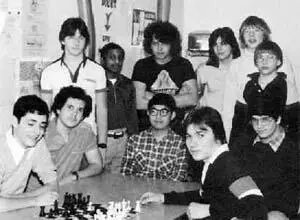Cambridge, Massachusetts
April 2004
Chapter 1. Why Nerds Are Unpopular
When we were in junior high school, my friend Rich and I made a map of the school lunch tables according to popularity. This was easy to do, because kids only ate lunch with others of about the same popularity. We graded them from A to E. A tables were full of football players and cheerleaders and so on. E tables contained the kids with mild cases of Down's Syndrome, what in the language of the time we called "retards."
We sat at a D table, as low as you could get without looking physically different. We were not being especially candid to grade ourselves as D. It would have taken a deliberate lie to say otherwise. Everyone in the school knew exactly how popular everyone else was, including us.
I know a lot of people who were nerds in school, and they all tell the same story: there is a strong correlation between being smart and being a nerd, and an even stronger inverse correlation between being a nerd and being popular. Being smart seems to make you unpopular.
Why? To someone in school now, that may seem an odd question to ask. The mere fact is so overwhelming that it may seem strange to imagine that it could be any other way. But it could. Being smart doesn't make you an outcast in elementary school. Nor does it harm you in the real world. Nor, as far as I can tell, is the problem so bad in most other countries. But in a typical American secondary school, being smart is likely to make your life difficult. Why?
The key to this mystery is to rephrase the question slightly. Why don't smart kids make themselves popular? If they're so smart, why don't they figure out how popularity works and beat the system, just as they do for standardized tests?
One argument says that this would be impossible, that the smart kids are unpopular because the other kids envy them for being smart, and nothing they could do could make them popular. I wish. If the other kids in junior high school envied me, they did a great job of concealing it. And in any case, if being smart were really an enviable quality, the girls would have broken ranks. The guys that guys envy, girls like.
In the schools I went to, being smart just didn't matter much. Kids didn't admire it or despise it. All other things being equal, they would have preferred to be on the smart side of average rather than the dumb side, but intelligence counted far less than, say, physical appearance, charisma, or athletic ability.
So if intelligence in itself is not a factor in popularity, why are smart kids so consistently unpopular? The answer, I think, is that they don't really want to be popular.
If someone had told me that at the time, I would have laughed at him. Being unpopular in school makes kids miserable, some of them so miserable that they commit suicide. Telling me that I didn't want to be popular would have seemed like telling someone dying of thirst in a desert that he didn't want a glass of water. Of course I wanted to be popular.
But in fact I didn't, not enough. There was something else I wanted more: to be smart. Not simply to do well in school, though that counted for something, but to design beautiful rockets, or to write well, or to understand how to program computers. In general, to make great things.
At the time I never tried to separate my wants and weigh them against one another. If I had, I would have seen that being smart was more important. If someone had offered me the chance to be the most popular kid in school, but only at the price of being of average intelligence (humor me here), I wouldn't have taken it.
Much as they suffer from their unpopularity, I don't think many nerds would. To them the thought of average intelligence is unbearable. But most kids would take that deal. For half of them, it would be a step up. Even for someone in the eightieth percentile (assuming, as everyone seemed to then, that intelligence is a scalar), who wouldn't drop thirty points in exchange for being loved and admired by everyone?
And that, I think, is the root of the problem. Nerds serve two masters. They want to be popular, certainly, but they want even more to be smart. And popularity is not something you can do in your spare time, not in the fiercely competitive environment of an American secondary school.
Alberti, arguably the archetype of the Renaissance Man, writes that "no art, however minor, demands less than total dedication if you want to excel in it." I wonder if anyone in the world works harder at anything than American school kids work at popularity. Navy SEALS and neurosurgery residents seem slackers by comparison. They occasionally take vacations; some even have hobbies. An American teenager may work at being popular every waking hour, 365 days a year.
I don't mean to suggest they do this consciously. Some of them truly are little Machiavellis, but what I really mean here is that teenagers are always on duty as conformists.
For example, teenage kids pay a great deal of attention to clothes. They don't consciously dress to be popular. They dress to look good. But to who? To the other kids. Other kids' opinions become their definition of right, not just for clothes, but for almost everything they do, right down to the way they walk. And so every effort they make to do things "right" is also, consciously or not, an effort to be more popular.
Nerds don't realize this. They don't realize that it takes work to be popular. In general, people outside some very demanding field don't realize the extent to which success depends on constant (though often unconscious) effort. For example, most people seem to consider the ability to draw as some kind of innate quality, like being tall. In fact, most people who "can draw" like drawing, and have spent many hours doing it; that's why they're good at it. Likewise, popular isn't just something you are or you aren't, but something you make yourself.
Figure 1-1. Gateway High School chess club, 1981. That's me, upper left.

The main reason nerds are unpopular is that they have other things to think about. Their attention is drawn to books or the natural world, not fashions and parties. They're like someone trying to play soccer while balancing a glass of water on his head. Other players who can focus their whole attention on the game beat them effortlessly, and wonder why they seem so incapable.
Even if nerds cared as much as other kids about popularity, being popular would be more work for them. The popular kids learned to be popular, and to want to be popular, the same way the nerds learned to be smart, and to want to be smart: from their parents. While the nerds were being trained to get the right answers, the popular kids were being trained to please.
So far I've been finessing the relationship between smart and nerd, using them as if they were interchangeable. In fact it's only the context that makes them so. A nerd is someone who isn't socially adept enough. But "enough" depends on where you are. In a typical American school, standards for coolness are so high (or at least, so specific) that you don't have to be especially awkward to look awkward by comparison.
Few smart kids can spare the attention that popularity requires. Unless they also happen to be good-looking, natural athletes, or siblings of popular kids, they'll tend to become nerds. And that's why smart people's lives are worst between, say, the ages of eleven and seventeen. Life at that age revolves far more around popularity than before or after.
Before that, kids' lives are dominated by their parents, not by other kids. Kids do care what their peers think in elementary school, but this isn't their whole life, as it later becomes.
Читать дальше













